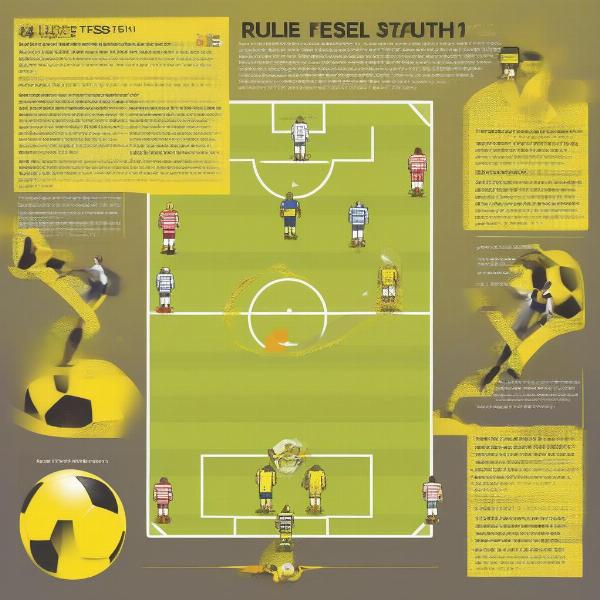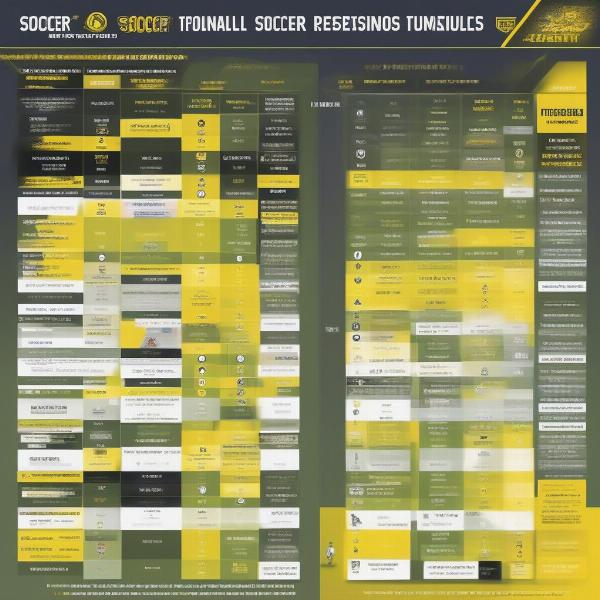Yellow cards in soccer are a common sight, a quick flash of color amidst the green of the pitch. But Do Yellow Cards Carry Over To The Next Game? The answer isn’t always straightforward and depends on several factors, including the specific competition and stage of the tournament. Let’s delve into the intricacies of yellow card accumulation and explore the various scenarios where these cautions might impact a player’s future matches.
Understanding Yellow Cards in Soccer
A yellow card is a caution issued by the referee for a variety of infringements, from unsporting behavior to delaying the restart of play. It serves as a warning to the player and is recorded in the match’s official documentation. While a single yellow card doesn’t lead to immediate removal from the game, accumulating multiple yellows can have significant consequences.
Do Yellow Cards Accumulate Across Matches?
The rules governing yellow card accumulation vary significantly between different competitions. In some leagues, like many domestic leagues around the world, yellow cards might reset after a certain number of games or at the end of the season. This means a player who receives a yellow card in one match won’t have it counted against them in the next season’s matches.
However, in tournament formats like the FIFA World Cup or continental championships like the UEFA European Championship, yellow cards typically accumulate throughout the competition’s group stage. This accumulation can lead to suspensions if a player receives two yellow cards in separate matches within the same tournament stage.
Tournament Specific Yellow Card Rules
It’s crucial for fans and players to understand the specific rules of each tournament. For instance, in the World Cup, yellow cards are typically wiped clean after the quarter-finals. This means that players who enter the semi-finals with a single yellow card have a clean slate and don’t risk suspension due to previous cautions. This rule aims to avoid players missing out on crucial late-stage matches due to accumulated yellow cards from earlier rounds.
 World Cup Yellow Card Accumulation Rules
World Cup Yellow Card Accumulation Rules
What Happens After Two Yellow Cards?
Receiving two yellow cards in the same match results in an automatic red card, meaning the player is sent off and their team must play with a reduced number of players. This double yellow card incident also counts as a suspension for the next match.
Impact of a Red Card
A red card, whether received directly or from two yellow cards, results in an immediate dismissal from the game and a suspension for the subsequent match. The length of the suspension can vary depending on the severity of the offense and the rules of the competition.
Yellow Card Reset Rules
The rules for resetting yellow cards vary across different competitions. Some leagues employ a rolling system where yellow cards are only counted within a specific number of games. For instance, in some leagues, yellow cards accumulated over ten games are no longer considered. Other competitions might reset yellow cards after a specific stage of the tournament, such as after the group stage.
 Yellow Card Reset Rules in Different Leagues
Yellow Card Reset Rules in Different Leagues
Why Do Yellow Card Rules Differ?
The differing yellow card rules across competitions often reflect the specific structure and format of the tournament or league. In longer league formats, a season-long accumulation of yellow cards might unduly penalize players for minor infringements. Tournament formats, on the other hand, often necessitate stricter accumulation rules to maintain fair play and prevent players from deliberately accumulating yellows to avoid suspension in less crucial matches.
Strategic Implications of Yellow Cards
Yellow card accumulation can have significant strategic implications for teams. Coaches need to be mindful of players who are on a yellow card and might risk suspension. This can influence substitutions and team tactics, especially in crucial matches where losing a key player could significantly impact the outcome.
 Soccer Coach Considering Yellow Card Strategy
Soccer Coach Considering Yellow Card Strategy
“Managing yellow cards is a crucial aspect of tournament strategy,” says renowned soccer analyst, James O’Connell. “Coaches need to be aware of the accumulation rules and make informed decisions to avoid losing key players to suspension.”
“The psychological impact of a yellow card can also be significant,” adds sports psychologist Dr. Emily Carter. “Players might become more cautious in their challenges, which can affect their performance.”
Conclusion
So, do yellow cards carry over to the next game? The answer is, it depends. Understanding the specific rules of the competition is paramount. While some leagues have reset mechanisms, tournaments often accumulate yellows throughout specific stages. This nuance in the rules adds another layer of complexity to the beautiful game, influencing both player behavior and managerial decisions. Remember to always consult the official rules of the specific competition you are following for the most accurate information on yellow card accumulation. We encourage you to share this article with fellow soccer enthusiasts so they too can be well-versed in the intricacies of yellow card rules.
FAQ
-
What is a yellow card in soccer?
A yellow card is a caution issued by the referee for a rule infringement. -
Does a yellow card result in a player being sent off?
No, a single yellow card doesn’t lead to immediate removal from the game. -
What happens if a player receives two yellow cards in the same match?
Two yellow cards result in a red card, and the player is sent off. -
Do yellow cards carry over between seasons in domestic leagues?
Generally, no. Yellow card tallies often reset at the end of the season in domestic leagues. -
Do yellow cards accumulate throughout the entire World Cup?
Yellow cards accumulate throughout the group stage and knockout stages until the quarter-finals, then they are reset. -
Why are there different rules for yellow card accumulation?
Different competition formats necessitate varying rules to ensure fair play and prevent strategic accumulation. -
How can I find the specific yellow card rules for a particular competition?
Consult the official rules and regulations published by the governing body of the competition.

